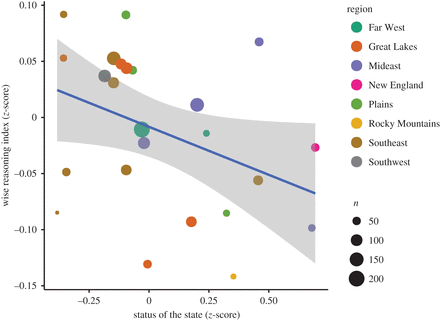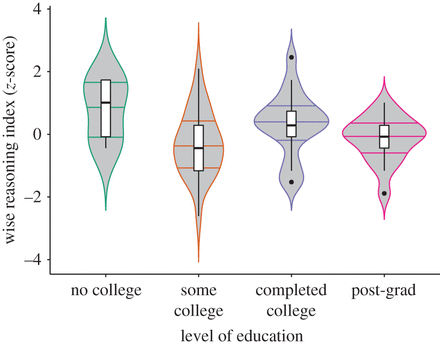陈明 编译
译者按:绝圣弃智,民利百倍;绝仁弃义,民复孝慈;绝巧弃利,盗贼无有。此三者以为文不足,故令有所属;见素抱朴,少私寡欲;绝学无忧。

Growing up working class gives people social skills that help broaden their perspective during conflicts.
成长中的工人阶级为人们提供的社交技巧,有助于他们在冲突中扩大视野。
There’s an apparent paradox in modern life: Society as a whole is getting smarter, yet we aren’t any closer to figuring out how to all get along. “How is it possible that we have just as many, if not more, conflicts as before?” asks social psychologist Igor Grossmann at the University of Waterloo in Canada.
现代生活中有一个明显的悖论:整个社会变得越来越聪明,但我们依然没有找到和睦相处的方法。加拿大滑铁卢大学的社会心理学家伊格尔·格罗斯曼(Igor Grossmann)说:“我们的冲突怎么可能和以前一样多呢?可能更多。”
The answer is that raw intelligence doesn’t reduce conflict, he asserts. Wisdom does. Such wisdom—in effect, the ability to take the perspectives of others into account and aim for compromise—comes much more naturally to those who grow up poor or working class, according to a new study by Grossman and colleagues.
他的观点是,天生的智力(intelligence)不会减少冲突。智慧(Wisdom)可以。格罗斯曼和同事最新的一项研究表明,如此的智慧其实是将他人的观点考虑进去,并达成妥协目标的能力。贫穷或工人阶级中长大的人,在这些能力上显得更为自然。

社会平均阶层越高的州,明智推理水平越低。n=每个州的参与人数。颜色代表的地区
“This work represents the cutting edge in wisdom research,” says Eranda Jayawickreme, a social psychologist at Wake Forest University in Winston-Salem, North Carolina.
北卡罗莱纳州温斯顿-塞勒姆维克森林大学的社会心理学家埃兰达·贾亚维克雷姆(Eranda Jayawickreme)说:“这项工作占据了智慧研究的前沿”。
To conduct the study, Grossmann and his graduate student Justin Brienza embarked on a two-part experiment. First, they asked 2145 people throughout the United States to take an online survey. Participants were asked to remember a recent conflict they had with someone, such as an argument with a spouse or a fight with a friend. They then answered 20 questions applicable to that or any conflict, including: “Did you ever consider a third-party perspective?” “How much did you try to understand the other person’s viewpoint?” and “Did you consider that you might be wrong?”
为了进行这项研究,格罗斯曼和他的研究生贾斯汀·布里恩扎(Justin Brienza)开始了两部分的实验。首先,他们在美国向2145人进行在线调查。要求参与者回忆最近和别人发生的冲突,比如和配偶的争吵,或者和朋友的打架。然后,他们回答了20个适用于这一问题或任何冲突的问题,包括:你是否考虑过第三方的观点?你试图理解对方观点的程度有多少?你认为你错了吗?
Grossmann and Brienza crunched the data and assigned the participants both a “wise reasoning” score based on the conflict answers and a “social class” score, then plotted the two scores against one another. They found that people with the lowest social class scores—those with less income, less education, and more worries about money—scored about twice as high on the wise reasoning scale as those in the highest social class. The income and education levels ranged from working class to upper middle class; neither the very wealthy nor the very poor were well represented in the study.
格罗斯曼和布里恩扎分析了数据,并且根据冲突的答案和“社会阶层”得分为参与者分配一个“明智的推理”得分,然后将这两个分数相互对照。他们发现,社会等级最低的人得分较低,收入较少,受教育程度低,对金钱的担忧更大,他们在明智推理量表上的得分是社会最高阶层的两倍。研究还发现,收入和教育水平在工人阶级和上层中产阶级之间是不等的;无论是富人还是穷人都在这项研究中表现得都很好。

In the second part of the experiment, the duo recruited 200 people in and around Ann Arbor, Michigan, to take a standard IQ test and read three letters to the Dear Abby advice column. One letter, for example, asked about choosing sides in an argument between mutual friends. Each participant then discussed with an interviewer how they thought the situations outlined in the letters would play out. A panel of judges scored their responses according to various measures of wise reasoning. In the example above, thinking about how an outsider might view the conflict would earn points toward wisdom, whereas relying only on one’s own perspective would not.
在实验的第二部分,俩人在密歇根州安娜堡及其周围招募了200名学生。这些学生参加了一项标准的智商测试,并且阅读了写给“亲爱的艾比专栏”的三封信。有一封信要求在朋友的争论之间选择立场。然后每个参与者都会和面试官讨论他们如何看待信件中列出的情况。一个评判小组根据各种明智的推理方法来衡量他们的回答。在上面的例子中,考虑到局外人可能会怎样看待冲突,就会赢得智慧分,而仅仅按照自己的观点思考则不会得分。
As with the first part of the experiment, those in lower social classes consistently had higher wise-reasoning scores than those in higher social classes, the researchers reported today in the Proceedings of the Royal Society B. IQ scores, however, weren’t associated one way or another with wise reasoning.
与第一部分实验结果一样,社会阶层较低的人的明智推理分数要高于较高社会阶层者的得分。研究人员在《皇家学会学报》上说,智商得分与明智的推理没有关联。
The findings make sense, Jayawickreme says, as people who grow up in a working-class environment have to rely on shared, communal resources more than people in the middle class, and therefore hone social techniques that smooth out conflicts with their peers. Those in the middle class, in contrast, tend to focus on education, which improves their IQ scores, but they don’t put nearly as much effort into conflict resolution skills, Grossmann says.
研究结果是有意义的。Jayawickreme说:“因为与中产阶级的人相比,在工人阶级环境中长大的人不得不依赖共享的公共资源,因此要磨练社交技巧来消除与同龄人的冲突。”Grossmann说:“与此相反,中产阶级的人倾向于把重点放在教育上,这会提高他们的智商分数,但是他们并没有把尽可能多的努力投入到解决冲突的技巧上。”

研究2:受教育程度较高的参与者,在人际冲突中不太可能表现出明智的推理
If you want to foster wise reasoning in yourself, Grossmann advises, try to use third-person language when thinking about conflicts. Mentally address both yourself and your conflict partner by name, for example, as it forces you to see the situation as others would see it. And seek out situations where your own experiences and expectations aren’t in the spotlight, such as by attending a multicultural movie festival or by volunteering at a homeless shelter.
“如果你想培养自己明智的推理能力,”Grossmann建议,“在思考冲突时,尽量使用第三人称的语言。”举例来说,在心理上称呼你自己和你冲突伙伴的名字,因为这会迫使你像对方一样看到别人的情况。并找出那些你自己的经验和期望不被看见时的情景,比如参加一个多元文化的电影节或在无家可归者收容所做义工。
Eventually, Grossman wants to expand his study of wisdom to people at the extremes of social class. “I would not be surprised if the result is even more pronounced in the extremely wealthy, but we don’t have the data to speak to it yet,” he says. “I would love to interview Donald Trump.”
最后,格罗斯曼想把他的智慧研究扩展到社会阶层的极端人群身上。“如果这一结果在极端富裕的人群中表现得更为明显,我不会感到惊讶,但我们还没有足够的数据来说明这一问题。”他说,“我很想就这个问题问问川普。”
Posted in: Brain & Behavior发表于《大脑与行为》
www.psychspace.com心理学空间网 F3.medium
F3.medium
